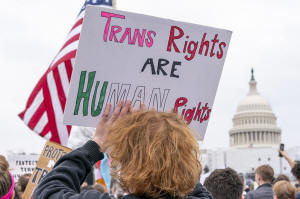Supreme Court seems likely to uphold Tennessee's ban on medical
treatments for transgender minors
 Send a link to a friend
Send a link to a friend
 [December 05, 2024]
By MARK SHERMAN [December 05, 2024]
By MARK SHERMAN
WASHINGTON (AP) — Hearing a high-profile culture-war clash, the Supreme
Court on Wednesday seemed likely to uphold Tennessee's ban on
gender-affirming care for minors.
The justices’ decision, not expected for several months, could affect
similar laws enacted by another 25 states and a range of other efforts
to regulate the lives of transgender people, including which sports
competitions they can join and which bathrooms they can use.
The case is being weighed by a conservative-dominated court after a
presidential election in which Donald Trump and his allies promised to
roll back protections for transgender people, showcasing the uneasy
intersection between law, politics and individual rights.
The Biden administration's top Supreme Court lawyer warned a decision
favorable to Tennessee also could be used to justify nationwide
restrictions on transgender healthcare for minors.
In arguments that lasted more than two hours, five of the six
conservative justices voiced varying degrees of skepticism of arguments
made by the administration and Chase Strangio, the ACLU lawyer for
Tennessee families challenging the ban.
Chief Justice John Roberts, who voted in the majority in a 2020 case in
favor of transgender rights, questioned whether judges, rather than
lawmakers, should be weighing in on a question of regulating medical
procedures, an area usually left to the states.
”The Constitution leaves that question to the people’s representatives,
rather than to nine people, none of whom is a doctor,” Roberts said in
an exchange with Strangio.
The court’s three liberal justices seemed firmly on the side of the
challengers. But it’s not clear that any of the conservatives will go
along.

Justice Sonia Sotomayor pushed back against the assertion that the
democratic process would be the best way to address objections to the
law. She cited a history of laws discriminating against others, noting
that transgender people make up less than 1% of the U.S. population,
according to studies. There are an estimated 1.3 million adults and
300,000 adolescents aged 13 to 17 who identify as transgender, according
the UCLA law school's Williams Institute.
“Blacks were a much larger part of the population and it didn’t protect
them. It didn’t protect women for whole centuries,” Sotomayor said in an
exchange with Tennessee Solicitor General Matt Rice.
Justice Ketanji Brown Jackson said she saw some troubling parallels
between arguments made by Tennessee and those advanced by Virginia and
rejected by a unanimous court, in the 1967 Loving decision that
legalized interracial marriage nationwide.
Quoting from the 57-year-old decision, Jackson noted that Virginia
argued then that “the scientific evidence is substantially in doubt and,
consequently, the court should defer to the wisdom of the state
legislature.”
Justice Neil Gorsuch, who wrote the majority opinion in 2020, said
nothing during the arguments.
The arguments produced some riveting moments. Justice Samuel Alito
repeatedly pressed Strangio, the first openly transgender lawyer to
argue at the nation's highest court, about whether transgender people
should be legally designated as a group that’s susceptible to
discrimination.
Strangio answered that being transgender does fit that legal definition,
though he acknowledged under Alito’s questioning there are a small
number of people who de-transition. “So it's not an immutable
characteristic, is it?” Alito said.
Strangio did not retreat from his view, though he said the court did not
have to decide the issue to resolve the case in his clients' favor.
There were dueling rallies outside the court in the hours before the
arguments. Speeches and music filled the air on the sidewalk below the
court’s marble steps. Advocates of the ban bore signs like “Champion
God’s Design” and “Kids Health Matters,” while the other side proclaimed
“Fight like a Mother for Trans Rights” and “Freedom to be Ourselves."
Four years ago, the court ruled in favor of Aimee Stephens, who was
fired by a Michigan funeral home after she informed its owner that she
was a transgender woman. The court held that transgender people, as well
as gay and lesbian people, are protected by a landmark federal civil
rights law that prohibits sex discrimination in the workplace.
[to top of second column]
|

People attend a rally as part of a Transgender Day of Visibility,
Friday, March 31, 2023, by the Capitol in Washington. (AP
Photo/Jacquelyn Martin, File)
 The Biden administration and the
families and health care providers who challenged the Tennessee law
urged the justices to apply the same sort of analysis that the
majority, made up of liberal and conservative justices, embraced in
the case four years ago when it found that “sex plays an
unmistakable role” in employers' decisions to punish transgender
people for traits and behavior they otherwise tolerate.
The issue in the Tennessee case is whether the law violates the
equal protection clause of the 14th Amendment, which requires the
government to treat similarly situated people the same.
Tennessee's law bans puberty blockers and hormone treatments for
transgender minors, but allows the same drugs to be used for other
purposes.
Solicitor General Elizabeth Prelogar, the administration's top
Supreme Court lawyer, called the law sex-based line drawing to ban
the use of drugs that have been safely prescribed for decades and
said the state “decided to completely override the views of the
patients, the parents, the doctors.”
She contrasted the Tennessee law with one enacted by West Virginia,
which set conditions for the health care for transgender minors, but
stopped short of an outright ban.
Rice countered that lawmakers acted to regulate “risky, unproven
medical interventions” and, at one point, likened the use of puberty
blockers and hormone treatments to lobotomies and eugenics, now
thoroughly discredited but once endorsed by large segments of the
medical community.
Rice argued that the Tennessee law doesn’t discriminate based on
sex, but rather based on the purpose of the treatment. Children can
get puberty blockers to treat early onset puberty, but not as a
treatment for gender dysphoria.
“Our fundamental point is there is no sex-based line here,” Rice
said.
While the challengers invoked the 2020 ruling in Bostock v. Clayton
County for support, Tennessee relied on the court's
precedent-shattering Dobbs decision in 2022 that ended nationwide
protections for abortion and returned the issue to the states.
The two sides battled in their legal filings over the appropriate
level of scrutiny the court should apply. It's more than an academic
exercise.
The lowest level is known as rational basis review and almost every
law looked at that way is ultimately upheld. Indeed, the federal
appeals court in Cincinnati that allowed the Tennessee law to be
enforced held that lawmakers acted rationally to regulate medical
procedures, well within their authority.
The appeals court reversed a trial court that employed a higher
level of review, heightened scrutiny, that applies in cases of sex
discrimination. Under this more searching examination, the state
must identify an important objective and show that the law helps
accomplish it.
If the justices opt for heightened scrutiny, they could return the
case to the appeals court to apply it. That's the course Prelogar
and Strangio pushed for on Wednesday, though there did not seem to
be much support for it.
Gender-affirming care for youth is supported by every major medical
organization, including the American Medical Association, the
American Academy of Pediatrics and the American Psychiatric
Association.

But Justices Clarence Thomas, Samuel Alito and Brett Kavanaugh all
highlighted a point made by Tennessee in its legal briefs claiming
that health authorities in Sweden, Finland, Norway and the United
Kingdom found that the medical treatments "pose significant risks
with unproven benefits.”
If those countries “are pumping the brakes on this kind of
treatment," Kavanaugh said, why should the Supreme Court question
Tennessee's actions?
None of those countries has adopted a ban similar to the one in
Tennessee and individuals can still obtain treatment, Prelogar said.
Kavanaugh, who has coached his daughters’ youth basketball teams,
also wondered whether a ruling against Tennessee would give
transgender athletes "a constitutional right to participate in
girls' sports.”
Prelogar said a narrow decision would not affect the sports issue.
All contents © copyright 2024 Associated Press. All rights reserved |